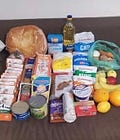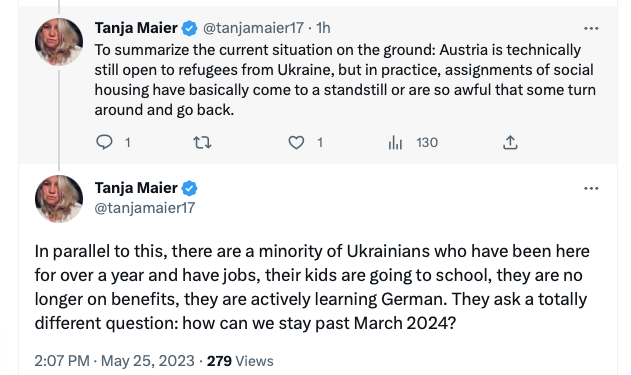Ivan & the "grannies" of Kyiv
I had the pleasure of speaking with Ivan Subbotin of Kyiv yesterday. He and his small team are providing 200 elderly residents of Kyiv with groceries on a regular basis. I wanted to learn more...
Ivan Subbotin of Kyiv describes himself (in perfect English with a rich and easy-flowing vocabulary — he regularly pauses to ask if using a particular idiom correctly) as “an average guy” who worked, before the war, in a variety of jobs, from operations director to HR manager. He lives in Kyiv with his wife and ten year-old son. Back in February 2022, Ivan had an Etsy shop selling pdf files with cross-stich patterns. During the weeks that followed Russia’s invasion of Ukraine, Ivan’s Etsy shop experienced a totally unexpected surge in sales. You all might remember there was a time, very early in the war, when those of us outside of Ukraine were urged to “buy Ukrainian” and folks in the U.S. and Canada were even renting Airbnbs in Ukraine they had no intention of staying in, just to help send funds to ordinary families in need.
As Ivan explained to me over video call yesterday evening (I could see the leafy Kyiv streets in the background as he swung his phone around to show me something outside, and I felt a ping of nostalgia so sharp for post-Soviet summer streets…it’s hard to describe but that quick flash made me want to jump immediately onto the next train/bus/car heading east), he received more than enough funds on his Etsy shop to feed his own family of three, so he decided to help his neighbours. Ivan explains that in his past life, he, like 99% of us, went about his own life, thought about his own family, and didn’t pay that much attention to the needs of the others around him, and certainly not to those of the pensioners in his neighbourhood. Ivan began buy buying and delivering groceries to a few “grannies” as Ivan calls them living in his building. He says he wanted to give them “a drop of happiness during such a desperate time”. The delivery was a useful and most welcome distraction. Word began to spread over the “sundress radio”, or granny grapevine, and Ivan began to receive more requests from pensioners in Kyiv. International individual private donors found Ivan on social media, and the project grew.
Today Ivan and his team of three in Kyiv and one in Zaporizhzhia (he makes sure they are all paid for their time and Ivan does pay himself enough to buy food for his own family out of the funds raised — he is very transparent and up front about this, explaining many people are out of work in Ukraine and no one can be expected to work for free) are caring for 200 grannies to whom they have made a commitment to deliver groceries on a regular basis. At the moment, that interval is once every 5 weeks. When they raise more funds, Ivan hopes to narrow that to one delivery per month, and then if they achieve this, he will open up sign-ups to “new” grannies.
Ivan talks about his work, explaining he now feels “like I was blind before” (this really resonated with me after my own volunteer work since February 2022). The average Ukrainian pensioner receives a pension of $80-85 per month, of which nearly half goes towards his/her communal payment (utilities, gas, water for their apartment). That leaves something like $40 to feed oneself for a month and buy medicine. Prices in Ukraine have also soared since the war started. Many of the grannies are “lonely”, Ivan explains, meaning they either did not have children, or their adult children died. There are twelve such grannies on Ivan’s list who experienced the terrible fate of having buried their own children. Ivan reflects on how he ended up in this very personal role, stepping into the lives of vulnerable, elderly people, “I am a big believer that you cannot run away from your own fate, you cannot avoid it.”
Ivan and I talk a bit about the differences between grassroots organizations and the big NGOs. We have rather similar takes despite me having volunteered solely in Austria, and Ivan’s work has been solely in Ukraine. Ivan uses terms like “direct action” and “fast”, and I feel like I am talking to myself in the mirror. I ask him to send me a few photos after our phone call. He asks for 30 minutes time (as if to indicate that is a “slow” response) and then sends me 20. He is as fast as I am, I thought to myself, in my next breath wondering why everyone can’t work like that. Why those getting paid to help can’t work like that.
Ivan’s photos speak for themselves. There is so much life and humanity and he captures the emotions. Over his social media, he shares the stories of the Ukrainian pensioners he meets, in perfect English. It is a window into a generation many of us would otherwise never encounter.
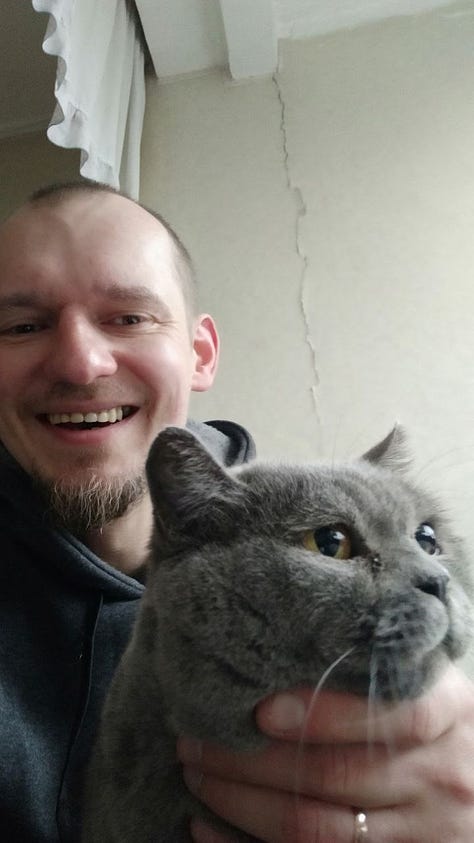
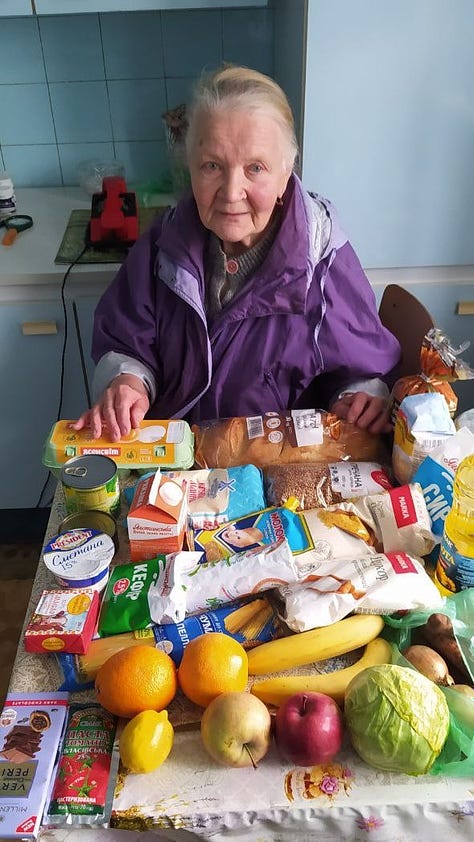
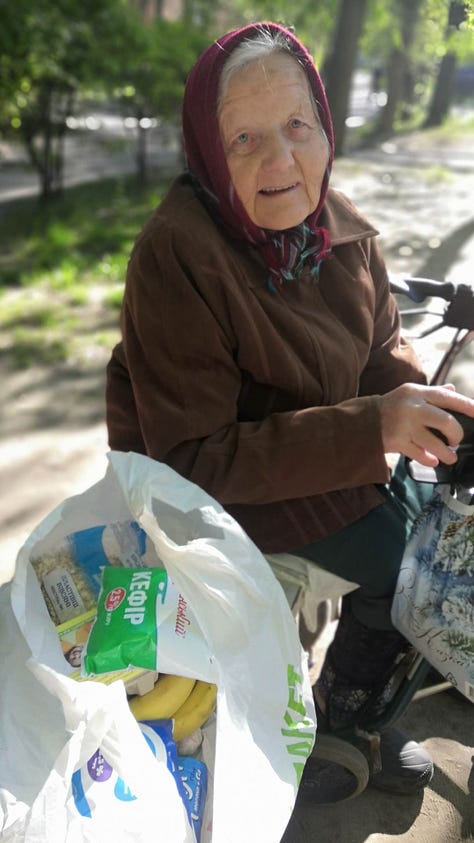
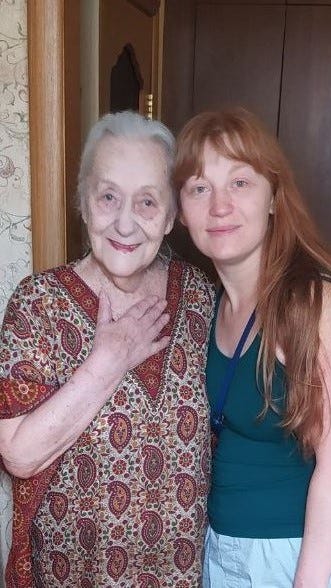

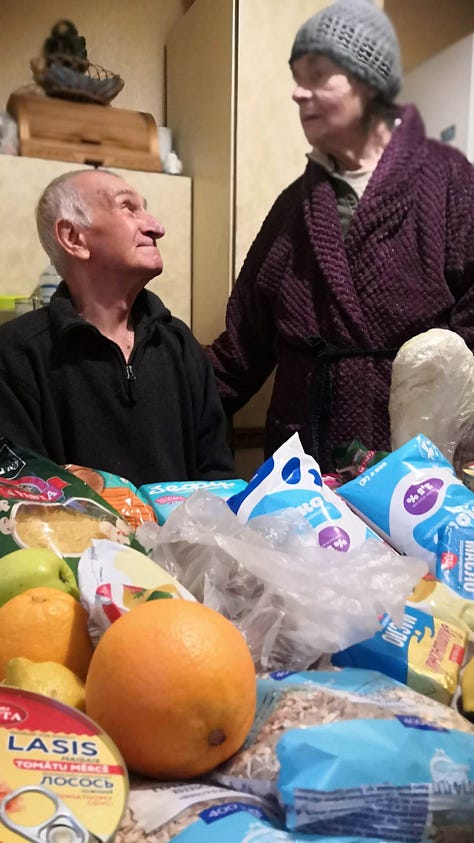
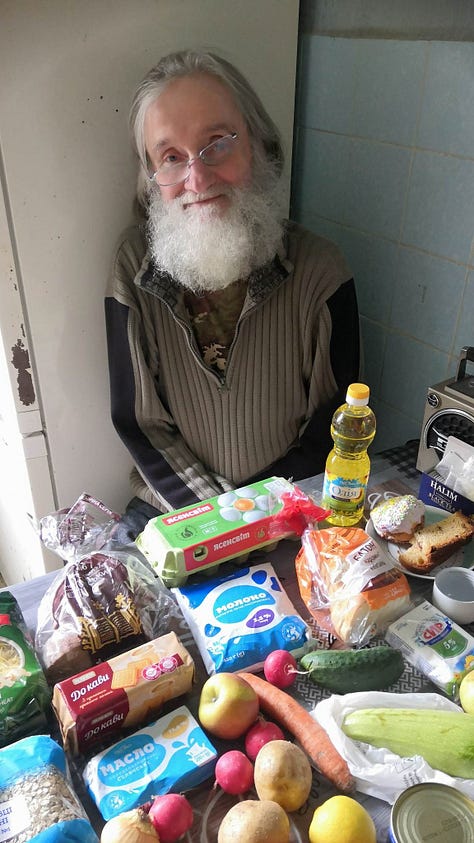
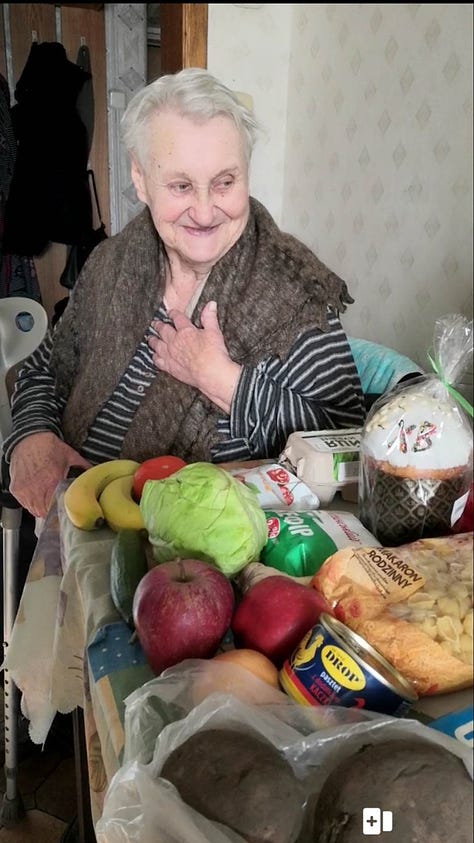
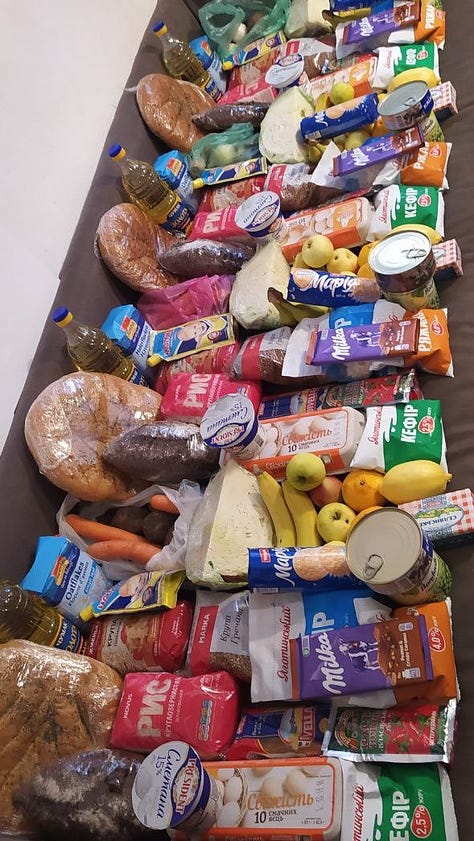
Ivan and I talk about the challenges of fundraising. He too receives nearly all his funding from private donors, many of whom live outside of Ukraine. He never received any donations from major NGOs, despite having even attempted a mass letter-writing campaign. This is absolutely our experience as well (except I never even bothered to write letters). Ivan knows how important it is to take the time to share all the details of his work on social media and the stories he hears, the full circle of reporting.
I ask about the groceries themselves. There is a basic list which everyone receives. Ivan says it represents about 70% of each delivery. Then there are personalised requests, such as dietary requirements. The amount of money they spend on each delivery depends on how much money they raise, but in general a delivery to one granny costs somewhere between $30-35. Sometimes they also buy medicine too, when necessary. As Ivan pays his team a salary, and feeds his own family, each delivery has an all-in cost of $40-45, including petrol (Ivan uses his own car for shopping and deliveries). The vast majority of donations go directly to feed the grannies. Unlike the situation here, where many volunteers have day jobs which pay their bills, Ivan is upfront about the need to take care of his team and his own family in the process. I so appreciate his honestly. Mario and I have worked from day one as volunteers, because our personal circumstances have allowed us to do so, but this is also a reason why I have no “team”: I could not ask anyone else to volunteer her/his time for free, and €50 donated to us goes directly into a €50 grocery card. We don’t expense any overhead costs. Even our postage stamps are donated (thank you!).
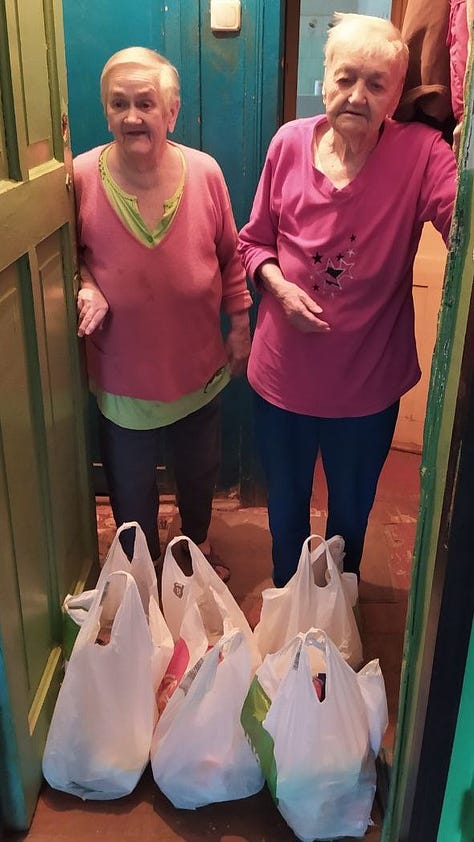
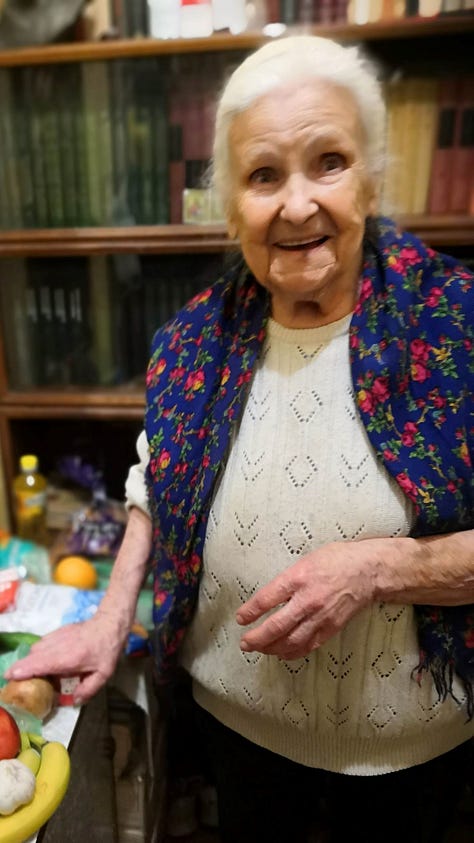
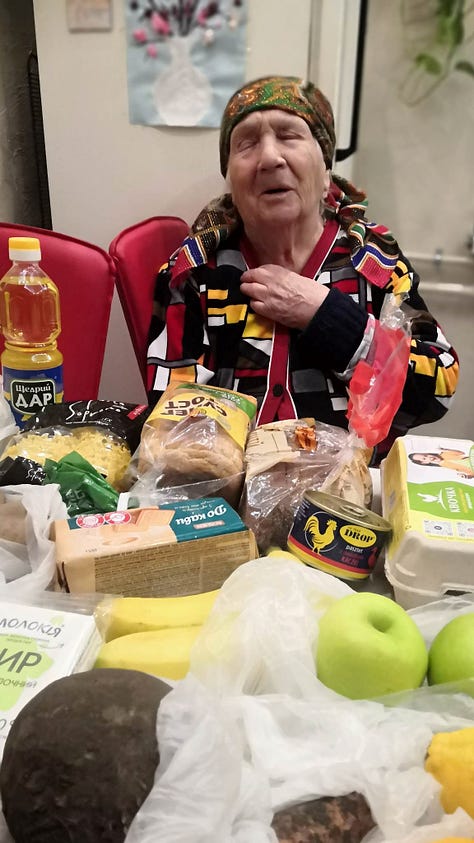
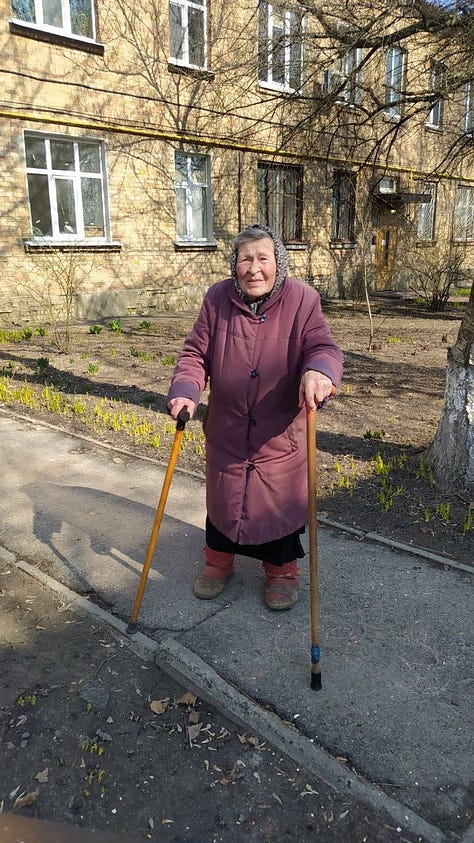
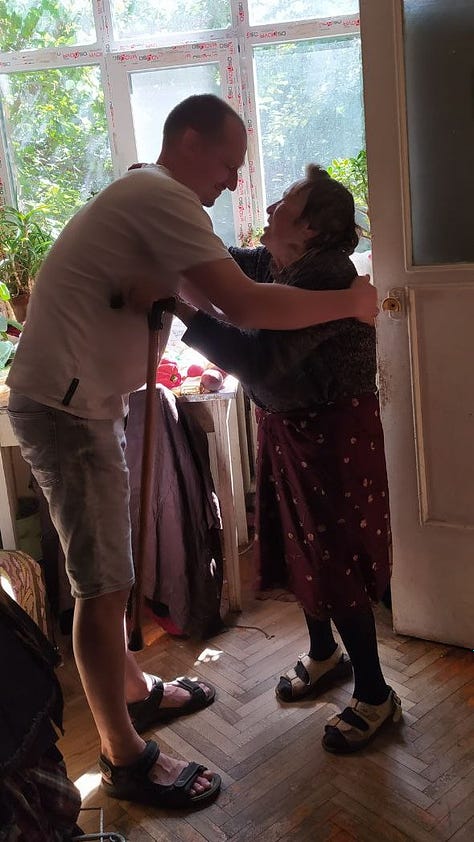
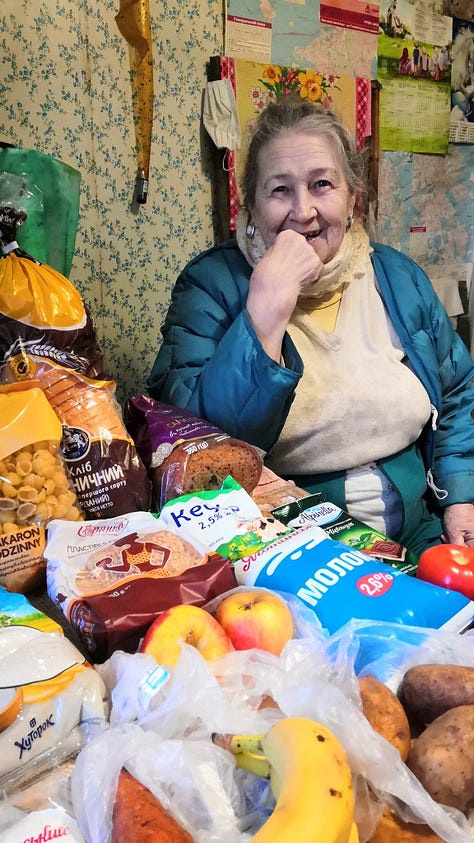
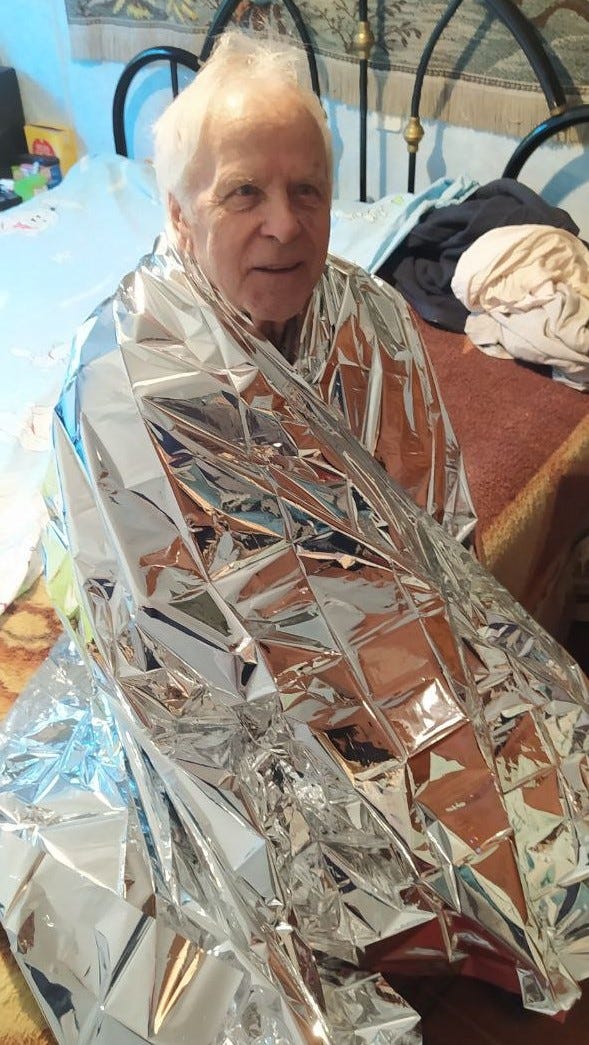
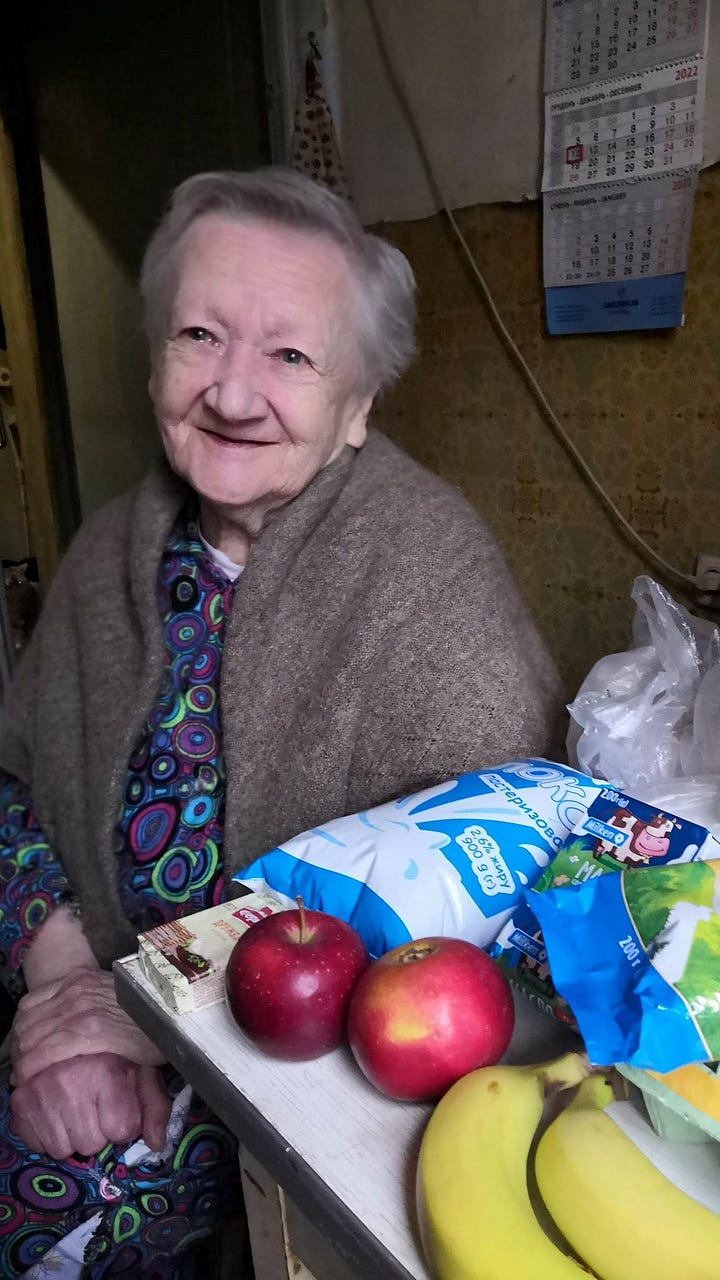
Ivan’s PayPal is ivansubbotin1983@gmail.com. He shares his work and the grannies’ stories and words of wisdom on Instagram, Facebook and Twitter. His Facebook group Candles for Grannies seems, from a quick glance, to be a rather lovely group of very international online friends supporting Ivan and his family in their work and glimpsing into their lives in wartime Kyiv.
I share Ivan’s story also as a window into what is surely happening on a grassroots level across Ukraine a million times over. The country’s economy during this war has been ravaged, and many vulnerable groups cannot evacuate. Many vulnerable people, including the elderly, are surviving thanks to the kindness of strangers. And that kindness is usually in the form of a small group of local volunteers who know their neighbourhood, know who needs help, and how to raise funds to provide it. These Ukrainians are serving their country too, in their own way. Buying food and delivering it to elderly, many of whom are bed-bound, is not easy. In fact, it is much harder than what we do, simply sending out cards with which families can buy their own groceries. We build in an assumption that those we are helping can go the store on their own. Ivan is helping some grannies who cannot do their own shopping. I ask him, who helps those who cannot help themselves, when there are no relatives? Neighbors, usually, he explains.
Speaking with Ivan I sensed very clearly that he has been forever changed by his own work, a feeling I relate to.
I would love to share more stories from Ukraine like Ivan’s, and I will, when I come across them. They are not so easy to find, perhaps because those busy doing good work are usually too exhausted to spend a lot of time on PR. Totally understandable. Both Ivan and I share a common understanding that sharing the stories, reporting back, is the only way to be able to keep on helping.
I felt this acutely this morning when I delivered the last of my €50 supermarket gift cards: two by mail, two in person at the arrival center, including to a man with a rare illness, a degenerative muscle condition, who has no housing and no prospect of housing. Doctors in Estonia told him to go to Austria. Austria hasn’t provided him with a room in Vienna (yet). The last card I gave to a social worker to give to a family of five with a new baby in need. There are some very good apples working inside the big NGOs, trying in their own way to help when they can. Going above and beyond their job descriptions. The horrible thing is often they have to do this in fear of being reprimanded within. Some of the stories you hear…breaks your heart and makes you ask what kind of stone cold hearted people are actually in charge. Seriously.
You all know what I want to say about all this. I have been repeating it so much it makes me want to scream. In short:
There are good individuals trying to help, but none of them have the power to make global decisions. I am starting to get messages from Ukraine, asking me about Austria. I really hope Austria will either make more housing available (seriously unlikely in this political climate) or do the responsible thing and make an official announcement not to come here unless you can afford your own housing. We may soon have a situation in which hospitals and doctors, thanks to the country’s generous health insurance coverage, will be treating some very sick Ukrainians with serious illnesses, but those same Ukrainians may not have a place to live nor any money to take care of their other needs. You hear stories that a doctor recommends a dietary change and the refugee asks, with what money? And for every family, like the one mentioned in my second tweet above, making long-term plans, I imagine there are three more families thinking about when they can go home to Ukraine, when will it be safe, because holding out here is just so damn hard. It is not for the faint of heart.
My waiting list is presently a dozen envelopes and counting. Most but not all are in the arrival center (which is ironically technically closed but very much open and full of people). Also several requests from mothers with large families (3 kids). The easiest way to help my small waiting list is to please email me gift certificates (both Hofer and Spar offer €50 online for purchase) or to donate here. Thank you.
Recommended:
Inside eastern Ukraine's under fire healthcare system and on board the MSF medical train taking patients to safety. Marc Bennetts and Kasia Sobocinska:
On board Ukraine’s hospital train rescuing wounded from the war | Times Reports
“Every day I had less money. Time dragged on and my savings had run out, so I had to ask family and friends for money.” Kateryna Semchuk of Open Democracy speaks to Ukrainians facing job losses and high prices as a result of Russia's invasion:
Utility bill hike set to compound ordinary Ukrainians’ economic pain.
“Ukraine’s economy has taken a battering from Russia’s invasion, with unemployment high and consumer debt soaring.”
Thank you for your continued interest and support! I received this gorgeous photo of gratitude yesterday afternoon:

